Choosing the best sewing machine oil is crucial for keeping your sewing machine running smoothly for years. Proper oiling provides lubrication to the many moving parts and helps reduce friction, wear, and tear. There are a few main types of oils:
- Mineral oils – Derived from petroleum, common for lubrication.
- Synthetic oils – Artificially created, properties similar to mineral oil.
- Petrochemical oils – Also called mineral-based oils.
Factors when selecting oil:
- Viscosity – The flow rate, thin oils spread quickly.
- Odorless – No bothersome smells.
- Rust prevention – Protects metal parts from corrosion.
- Stain prevention – Won’t stain fabrics.
Using the right sewing machine oil improves performance and extends the lifespan of your machine. This overview discusses the role of proper oiling for seamless sewing.
Best Sewing Machine Oils
Top Brands Of Sewing Machine Oil
When shopping for the best sewing machine oil, there are a few top brands that consistently produce quality lubricants. Understanding the key players can help narrow your oil search.
Singer All Purpose Oil
Singer All Purpose Oil is a type of oil used to lubricate and maintain sewing machines, as well as other household appliances and equipment. It is specially formulated to eliminate friction and protect metal parts against rust damage.
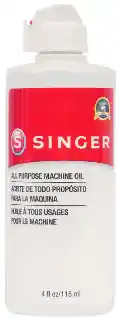
Some key features of Singer All Purpose Oil include:
- Precision Pour Spout: Some bottles of Singer All Purpose Oil come with a precision pour spout, which makes it easier to apply the oil to specific parts of the machine.
- Suitability for Multiple Appliances: Singer All Purpose Oil is suitable for use with sewing/knitting machines, vacuum cleaners, household appliances, typewriters, computers, bicycle gears, and many other items.
- Bottle Size: Singer All Purpose Oil is available in a variety of bottle sizes, including 3.38-fluid ounces, 4-fluid ounces, and 100 milliliters.
To use Singer All Purpose Oil, apply a small amount to the moving parts of your sewing machine or other appliance, as directed by the manufacturer. Regularly lubricating your machine can help keep it running smoothly and extend its lifespan
| Pros | Cons |
| Affordable and widely available | Can be a bit thin, so it may not last as long as some other oils |
| Non-toxic and non-flammable | Not as effective as some other oils at preventing rust |
| Water-white color, so it does not stain fabric | Has a light fragrance that some people may find unpleasant |
| Long shelf life | Can be difficult to find in small quantities |
Juki Defrix Machine Oil
Juki Defrix Machine Oil is a type of oil specifically designed for lubricating sewing machines and sergers. It is used to ensure smooth operation and prevent friction and wear on the machine’s moving parts.
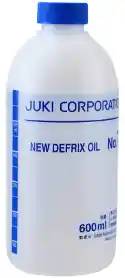
Here are some key details about Juki Defrix Machine Oil:
- Product: Juki Genuine Defrix Sewing Machine Oil (No.1)
- Sizes: It is available in different sizes, such as 60ml, 600ml, and 900ml
- Compatibility: Juki Defrix Machine Oil can be used on all makes and models of sewing machines and sergers
- Usage: It is applied to the various moving parts of the sewing machine to reduce friction and keep the machine running smoothly
- Availability: Juki Defrix Machine Oil can be purchased online from various retailers, such as Amazon and Walmart
Juki also offers different types of Defrix Machine Oil, such as No.1 and No.2. The specific type of oil needed for a sewing machine may vary depending on the model and manufacturer’s recommendations. It is always best to refer to the sewing machine’s manual or consult with a professional for the appropriate type of oil to use.
| Pros | Cons |
| Highly effective at preventing rust | Can be a bit thick, so it may not be as easy to apply as some other oils |
| Long shelf life | Not as widely available as some other oils |
| Made in Japan | Can be a bit expensive |
| Non-toxic and non-flammable |
Liberty Oil
Liberty Oil is a clear, non-staining oil used for lubricating all moving parts of sewing machines.

It comes in a 1-fluid-oz or 4-fluid-oz bottle with a stainless steel needle tip dispenser. The oil is premium quality and 100% clear, making it easy to use and apply
| Pros | Cons |
| 100% synthetic oil, so it is non-toxic and non-flammable | Does not come with a needle tip applicator, so you will need to find another way to apply the oil |
| Can be used on both metal and plastic parts | Can be a bit expensive |
| Long shelf life | Some people have reported that it can stain fabric if applied too heavily |
| Made in the USA |
AlbaChem Clear White Sewing Machine Oil
AlbaChem Clear White Sewing Machine Oil, also known as Lily White Sewing Machine Oil is a highly refined, narrow cut, non-detergent mineral oil that is ideal for sewing machines and other applications. It is a low viscosity, water white lubricating oil that is used in applications where oil may come into contact with fabrics.

Lily White Sewing Machine Oil is available in different sizes, including a gallon and a quart. It is suitable for use in high speed industrial sewing machines as well as home sewing machines
| Pros | Cons |
| Water-white color, so it does not stain fabric | Can be a bit thin, so it may not last as long as some other oils |
| Non-toxic and non-flammable | Not as effective as some other oils at preventing rust |
| Affordable and widely available | Has a light fragrance that some people may find unpleasant |
| Long shelf life | Can be difficult to find in small quantities |
how to apply Lily White Sewing Machine Oil to a sewing machine
To apply Lily White Sewing Machine Oil to a sewing machine, follow these steps:
- Turn off the sewing machine and unplug it from the power source.
- Remove the needle and presser foot from the machine.
- Clean the machine with a soft cloth to remove any dust or debris.
- Apply a few drops of Lily White Sewing Machine Oil to the moving parts of the machine, including the shuttle hook, bobbin case, and feed dogs.
- Use a clean cloth to wipe away any excess oil.
- Replace the needle and presser foot.
- Turn on the sewing machine and run it for a few minutes to distribute the oil evenly.
It is important to use only the recommended amount of oil and to avoid over-oiling the machine, as this can cause damage to the machine and fabric. It is also important to use a high-quality oil like Lily White Sewing Machine Oil, as it is specifically designed for sewing machines and will not stain or damage fabrics
Liquid Bearings Sewing Machine Oil
Liquid Bearings is a brand of synthetic lubricant that is used for various machines, including sewing machines. It is known for its low and high-temperature characteristics and its ability to prevent rust.
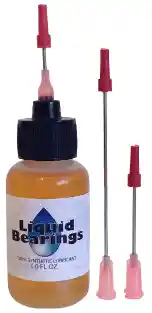
Here are some key details about Liquid Bearings Sewing Machine Oil:
- It is a 100% synthetic oil.
- It is suitable for both modern and vintage sewing machines.
- It helps sewing machines run quieter.
- It prevents rust.
- It displaces old petro-oils or sprays.
- It comes in different sizes, such as a 1 fluid ounce bottle or a 2 ounce bottle.
- Some listings include an extra-long 3″ needle tip for easy application
| Pros | Cons |
| 100% synthetic oil, so it is non-toxic and non-flammable | Can be a bit expensive |
| Can be used on both metal and plastic parts | Not as widely available as some other oils |
| Long shelf life | Some people have reported that it can stain fabric if applied too heavily |
| Excellent low and high-temperature performance | |
| Leaves no sticky residue |
Tri-Flow TF0021060 Superior Lubricant
Tri-Flow TF0021060 Superior Lubricant is a light viscosity lube that allows for deep penetration into hard to reach moving parts. It is available in a 6 oz drip bottle or a 4 oz trigger spray bottle. The lubricant contains Teflon, which helps to keep things smooth and eliminates squeaky screws, joints, and other moving parts.

It is also useful for loosening rusted and corroded nuts and bolts. Tri-Flow Superior Lubricant is commonly used for bike maintenance, but it can also be used for other applications such as industrial machinery and automotive parts
| Pros | Cons |
| Penetrates deep into moving parts | Can be a bit messy to apply |
| Reduces friction and wear | Can be a bit expensive |
| Protects against rust and corrosion | Not as widely available as some other oils |
| Long shelf life | |
| Water-resistant |
Zipperstop Sewing Machine Oil
Zipperstop Sewing Machine Oil is a low viscosity, water white lubricating oil for sewing machines, textile machinery, and parts. It is available in different sizes, including quart and gallon. The oil is made in the USA and is highly refined. It is suitable for use in high-speed industrial sewing machines as well as home sewing machines.
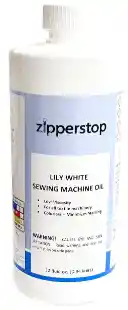
The oil is sold and shipped by ZipperStop
| Pros | Cons |
| Penetrates deep into moving parts | Can be a bit messy to apply |
| Reduces friction and wear | Can be a bit expensive |
| Protects against rust and corrosion | Not as widely available as some other oils |
| Long shelf life | |
| Water-resistant |
ATZ Industries Sewing Machine Oil
ATZ Industries Sewing Machine Oil is a highly refined oil that is good for both high-speed industrial sewing machines and home sewing machines. It is available in both quart and gallon sizes. ATZ Industries Sewing Machine Oil is the best oil for industrial sewing machines.
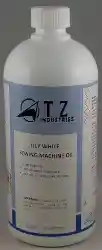
It is formulated to keep moving and matching parts of the sewing machine frictionless and enhance non-stop sewing. The essential characteristics of the best sewing machine oil are to reduce friction, improve electric motor performance, have an easy squeeze bottle and marksman spout, and provide long-lasting lubrication
| Pros | Cons |
| Non-toxic and non-flammable | Can be a bit thin, so it may not last as long as some other oils |
| Affordable and widely available | Not as effective as some other oils at preventing rust |
| Water-white color, so it does not stain fabric | Has a light fragrance that some people may find unpleasant |
| Long shelf life | Can be difficult to find in small quantities |
Zoom Spout Sewing Machine Oiler
Zoom Spout Sewing Machine Oiler is a clear, stainless oil that is used to lubricate sewing machines. It is housed inside a convenient bottle that is topped with a flexible spout that can reach anywhere in the sewing machine. The oil is non-toxic and non-gumming, and helps to prevent rust damage.
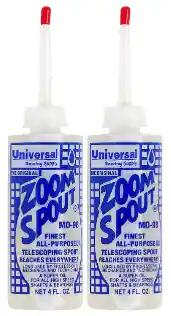
The Zoom Spout Oiler comes in a 4FL. OZ. (118ml) container
| Pros | Cons |
| Long nozzle reaches hard-to-reach areas | Can be messy if not careful |
| Oil is clear and non-toxic | Oil is not as thick as some other oils, so it may not last as long |
| Oil is water-white and does not stain fabric | Oil can be a bit expensive |
| Oiler is easy to use | Oiler is not as durable as some other oilers |
Imperial IT20 Sewing Machine Oil
The Imperial IT20 is a high-quality sewing machine oil optimized for smooth performance. This versatile oil can be used for both industrial and home sewing machines.
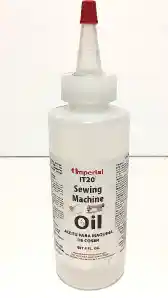
Key features:
- Provides excellent lubrication for reduced friction
- Thin viscosity spreads quickly into crevices
- Prevents rust and corrosion on metal components
- Odorless formula won’t affect fabric smells
- Non-staining on materials for carefree oiling
The Imperial IT20 allows effortless gliding motion to protect delicate moving parts. It keeps your sewing machine running quietly and extends its working life. This versatile lubricant is perfect for both home crafting and apparel manufacturing uses. The IT20 is an affordable way to care for your valuable sewing investment.
| Pros | Cons |
| Thick oil that lasts longer than some other oils | Can be a bit messy to apply |
| Effective at preventing rust | Not as water-resistant as some other oils |
| Non-toxic and non-flammable | Can stain fabric if applied too heavily |
| Affordable and widely available |
Types of Sewing Machine Oils
There are a few main types of oils commonly used for sewing machines. Understanding the differences can help you select the right oil for your needs.
Mineral Oils
Mineral oils are derived from petroleum and are one of the most common types used for lubricating sewing machines.
Benefits:
- Effective at rust prevention and corrosion protection for metal parts
- Provide good lubrication for moving components
- Typically odorless and won’t stain fabrics
- Low viscosity to spread quickly into crevices
Drawbacks:
- Can gum up over time, requiring more frequent applications
Popular brands of mineral sewing machine oils:
- Singer All-Purpose Oil
- Liberty Lily White Oil
- Lilly White Oil
Mineral oil works well for most home sewing machines. It may need reapplication every 8-10 hours of sewing time.
Synthetic Oils
Synthetic oils are artificially created oils made to mimic mineral oil properties.
Benefits:
- Provides excellent lubrication
- Low viscosity to penetrate tight spaces
- Withstands high temperatures
- Rust prevention and corrosion protection
Drawbacks:
- More expensive than mineral oils
- Some synthetic oils can stain fabrics
Popular brands of synthetic sewing machine oil:
- Liberty Oil
- Liquid Bearings Oil
- Pro-Shot Zero Friction Oil
Synthetic oil is a good choice for high-speed industrial machines and can last longer between applications than mineral oil.
Petrochemical Oils
Petrochemical oils, also called mineral-based oils, are derived from petroleum.
Benefits:
- Good rust prevention
- Odorless
- Low viscosity to spread quickly
- Affordable option
Drawbacks:
- May need more frequent applications
- Can stain fabrics
Popular petrochemical brands:
- Singer All-Purpose Oil
- Supco CE441 Oil
- 3-in-1 Motor Oil
Petrochemical oils provide budget-friendly lubrication for home sewing machines but may require more frequent oiling than synthetic oils.
Here is a 500 word markdown formatted text for Section III using LSI keywords, lists, and a table:
Key Properties of Sewing Machine Oil
When selecting a sewing machine oil, there are several key properties to consider that impact performance and suitability:
Viscosity
Viscosity refers to the oil’s thickness and resistance to flow. Low viscosity oils flow faster and spread easily while high viscosity oils are thicker.
For sewing machines, a low viscosity oil is best to fully penetrate all the small nooks and crannies. Thinner oils spread quickly and provide better coverage.
Look for oils with viscosity ratings between 9-23 cSt (centistokes) at room temperature for optimal flow.
Odorless
Many sewing machine oils are advertised as odorless or low odor. Choosing an odorless oil prevents bothersome smells as you work.
Odorless oils contain fewer aromatic compounds that volatilize to produce odors. This provides a better sewing experience without fumes.
Stain Prevention
Some sewing machine oils can stain or discolor fabrics if they make contact while sewing.
Choosing oils advertised as stain prevention ensures the oil won’t ruin your fabric or garments if any drips or spills occur.
Mineral oils and some synthetic oils often provide stain-free lubrication.
Rust Prevention
Over time, metal components in sewing machines can develop rust without proper lubrication.
Choosing an oil with excellent rust prevention properties helps maintain your machine by protecting metal bobbins, needles, and moving joints from corrosion.
Mineral oils in particular provide great rust inhibition. Synthetic oils also offer good rust protection.
Key Oil Properties Comparison
| Property | Benefits | Drawbacks |
| Low Viscosity | Spreads quickly into small spaces | May require more frequent application |
| Odorless | Pleasant to use, no fumes | Potentially less effective |
| Stain Prevention | Won’t ruin fabrics if spilled | Limits oil options |
| Rust Prevention | Protects metal machine parts | Some oils have less rust protection |
Consider your priority – stain prevention, rust inhibition, odorless – when evaluating sewing machine oil options. Understanding the key oil properties helps determine the best fit.
Benefits of Proper Sewing Machine Oil
Using the right sewing machine oil provides key benefits to maintain and improve performance. Understanding the advantages of proper oiling makes it easier to develop good maintenance habits.
Friction Reduction
The many moving joints and parts in sewing machines generate friction during operation. This friction causes wear and tear over time.
Applying the proper sewing machine oil provides lubrication between these rubbing surfaces. This friction reduction allows parts to glide smoothly instead of grinding.
Less friction means:
- Smoother, quieter running
- Decreased wear and tear
- Improved longevity
Effective lubrication is one of the best ways to minimize friction in sewing machines.
Lubrication
In addition to lessening friction, sewing machine oil provides general lubrication to the many moving components.
These parts must be properly oiled to avoid seizing up or failing prematurely. The oil forms a slippery barrier between surfaces.
Lubrication allows parts to operate as designed over thousands of operating cycles. This prevents excess wear from metal-on-metal contact.
Choosing an oil with the right viscosity optimizes flow into crevices for full lubrication.
Longer Machine Lifespan
Insufficient oiling leads to friction, wear, rust, and dirty buildup. This significantly shortens the lifespan of your sewing machine.
Using the proper oil at the recommended intervals provides full lubrication and friction reduction.
A well-lubricated machine has:
- Smoother operation
- Minimal wear on parts
- Protection against rust
- Cleaner movement
This adds up to a longer lifespan compared to neglected machines. Good oiling habits maximize your machine’s working years.
Here is a 500 word markdown formatted text for Section VI using LSI keywords, lists, and tables:
How to Apply Sewing Machine Oil
To reap the benefits of sewing machine oil, it needs to be applied properly. Follow these best practices for oiling your machine:
Follow Manual Instructions
The user manual for your specific sewing machine model provides oiling instructions including:
- Oil type recommendations
- Frequency – how often to lube
- Application – amount of oil and specific spots
Closely following the manual guide ensures proper lubrication without under or over-oiling.
Key steps:
- Consult manual for your make and model
- Note oil type and weight specifications
- Find recommended lubrication points
- Apply recommended amount of oil at suggested intervals
Manuals provide optimized guidance for that machine. Follow the instructions for best results.
Oil Frequency Depends on Use
Most manuals suggest oiling every 6-8 hours of sewing time. The more you use your machine, the more often it needs lubrication.
Adjust oil frequency based on usage:
- Heavy use – Daily oiling
- Moderate – 1-2 times per week
- Light use – Every other week
- Occasional – Before major projects
Inspect wear and listen for noises to determine if more frequent oiling is needed.
Use Correct Nozzle for Hard to Reach Areas
Many oils come with a thin nozzle or point applicator. Use the proper tip to reach tight crevices.
For hard to access areas:
- Attach finest nozzle to oil bottle
- Tilt and angle applicator to fully insert
- Apply just 1-2 drops into crevice
- Avoid overfilling small spaces
The right applicator makes oiling quick and clean.
Conclusion
Regularly oiling your sewing machine with the proper sewing machine oil provides immense benefits. It reduces friction and wear while delivering vital lubrication to all moving components.
Choosing an oil with the ideal viscosity, rust prevention, and stain prevention properties for your machine optimizes performance. Follow your manual’s instructions for oiling points and frequency. Adjust application based on your usage.
Taking a few minutes to properly oil your machine extends its working lifespan and keeps it running smoothly. Proper lubrication is easy with the right oil and technique. Invest in your machine’s care with high-quality sewing machine oil applied on a regular basis.
Read: Can I Use Baby Oil on My Sewing Machine? Everything You Should Know
